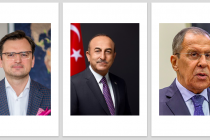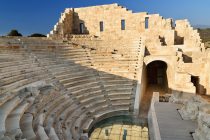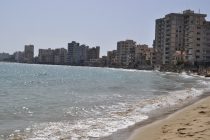On Friday morning, the entire Turkish Cypriot nation was glued to television screens cheering on Buse Savaşkan as she took part in the Women’s High Jump qualifications at the Paris Games.
The 25-year-old Olympic debutant secured a coveted spot in Sunday’s finals by equalling her personal best jump of 1.92 metres in the qualifiers – the same height that she first jumped in May, when she took gold at the Balkan Championships.
Savaşkan will now line up against 12 other women in the final on Sunday evening, including Australia’s Nicola Olyslagers (nee Mcdermott) and Ukraine’s Yaroslava Mahuchikh – the current world record holder, who respectively took silver and bronze at the last Olympic Games in Tokyo.
Born in Lefke, in the Turkish Republic of North Cyprus (TRNC), to an African-Turkish mother, Faika, from Episkobu, Limassol, and paediatric father Ilhan Savaşkan, who is originally from Sarıyer in Istanbul, Savaşkan’s remarkable performance means she now has a chance to claim an Olympic medal – a dream she has pursued against all odds.
Overcoming the Greek Cypriot imposed embargoes
Savaşkan is competing under the Turkish flag and her journey to the Olympics highlights the ongoing struggles faced by Turkish Cypriot athletes due to the Greek Cypriot-imposed embargoes.
Since seizing control of the Republic of Cyprus in December 1963, Greek Cypriots have insisted international institutions only recognise their authority, whilst excluding the Republic’s co-founders the Turkish Cypriots.
To overcome this state of affairs, the Turkish Cypriots established their own state – the TRNC – in 1983, but it is only recognised by Turkiye.
Most international sports federations follow the United Nations; if a country is a full member of the UN, then its national sports federations are able to join global sports bodies, such as the International Olympic Committee (IOC), World Athletics, International Judo Federation, and FIBA for basketball.

Sometimes, existing members of a global sports federation can ignore a country’s UN status and admit them anyway, as was the case for Kosovo, which became a member of the IOC in 2014 and football body FIFA in 2016, yet only half of the UN’s member states recognised Kosovo at that point.
Similarly, the TRNC, which also lacks formal UN recognition, could be granted representation within these same global sports bodies, but due to Greek Cypriots objecting to their presence, this route is mostly blocked for Turkish Cypriots. As such, athletes from North Cyprus are prevented from competing at international events under their country’s flag, and deprived of vital financial and professional support to enable their sporting development.
These politically driven restrictions force many Turkish Cypriot athletes to either abandon their Olympic aspirations or acquire alternative citizenship to participate on the world stage. Savaşkan’s story is no exception.
Russian athlete can compete for Cyprus while Buse Savaşkan must compete for Türkiye
Despite being born in North Cyprus, the high jumper is unable to represent the TRNC due to the embargoes. Yet she is also ineligible for Republic of Cyprus citizenship due to her Turkish father and the Greek Cypriot authorities’ discriminatory anti-Turkish nationality criteria.
The only viable way forward for Savaşkan was to obtain citizenship from the Republic of Türkiye. In doing so, she followed in the footsteps of former Turkish Cypriot sprinters Meliz Redif and Yiğitcan Hekimoğlu, who also became Turkish nationals to compete internationally.

In a bizarre twist, Elena Kulichenko, a Russian-born athlete, will compete against Savaşkan in Sunday’s Women’s High Jump final in Paris as a Cyprus national. Kulichenko’s family acquired Cypriot citizenship in 2019 through an investment scheme that allowed her Russian entrepreneur father to apply for passports for himself and his family.
Known as “golden passports”, this controversial investor programme sparked fierce debate as it granted 7,000 foreign nationals EU citizenship via Cyprus between 2007 and 2020.
Criticised for its lack of transparency, the programme was formally dropped in November 2020 after leaked documents brought the scheme into disrepute.
Sport without discrimination is a fundamental principle of Olympism
It’s important to note that the IOC Constitution prohibits any form of discrimination. The ‘Fundamental Principles of Olympism’, as set out in the current IOC Charter, adopted in October 2023, states:
“The practice of sport is a human right. Every individual must have access to the practice of sport, without discrimination of any kind in respect of internationally recognised human rights within the remit of the Olympic Movement. The Olympic spirit requires mutual understanding with a spirit of friendship, solidarity and fair play” [Clause 4].
It further adds, “The enjoyment of the rights and freedoms set forth in this Olympic Charter shall be secured without discrimination of any kind, such as race, colour, sex, sexual orientation, language, religion, political or other opinion, national or social origin, property, birth or other status” [Clause 6].
View this post on Instagram
Historically, athletes from countries where there were issues such as international sanctions or political transition could compete as independent athletes. For the 2024 Summer Olympics in Paris these athletes are known as Individual Neutral Athletes and will mainly be from Russia and Belarus, whose participation from global sporting events have been banned following the Russian invasion of Ukraine in 2022.
Theoretically, Turkish Cypriot athletes like Savaşkan could apply to the IOC for independent status, but the financial and practical support an athlete receives from being part of a recognised country’s Olympic delegation, such as Turkiye, suggests this is the optimum alternative for athletes from the TRNC.
Savaşkan’s TRNC roots removed from IOC website
Interestingly, Savaşkan’s entry on the Paris Olympics IOC website had initially noted that she was born in “Northern Cyprus” and, under General Interests, that she is “A citizen of the Turkish Republic of Northern Cyprus” who “represents Turkiye internationally”.
After the Turkish Cypriot diaspora highlighted this positive, factually correct description on Friday, this text was mysteriously removed. The IOC have been approached for a comment on why the text about her identity and roots has been removed.
Whatever the reason, nothing can hide Savaşkan’s pride in being an athlete from the TRNC, which she mentions wherever she can.
Paris’te yapılan 2024 Olimpiyat Oyunları’nda Türkiye’yi yüksek atlama dalında temsil eden ve finale kalan Kıbrıslı Türk Buse Savaşkan, bu akşam saat 20.55’te piste çıkacak. pic.twitter.com/lEhMMGEvv5
— Türk Ajansı Kıbrıs (TAK) (@TAKAjansi) August 4, 2024
Her parents and representatives from the Turkish Cypriot Athletics Federation in Paris have also been wearing colourful t-shirts that display her photo and the TRNC flag, along with the message “Turkish Cypriot Olympic athlete”.
Buse Savaşkan’s success in reaching the Paris Olympics stands as a testament to her resilience and determination, while giving the Turkish Cypriot nation a huge sense of hope and pride.
She now has the opportunity to make history. We wish Buse (pictured below with her parents in Paris) all the best in the Women’s High Jump finals, which start at 18.50 UK time.





